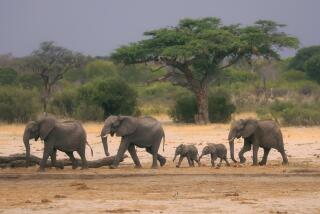Controversial ‘White Gold’ Goes on the Auction Block
- Share via
WINDHOEK, Namibia — On the outskirts of this arid African capital, thousands of elephant tusks fill metal shelves stretching into the gloom of a nondescript warehouse.
Some are weathered gray, like driftwood. Others are yellowed from the sun. The smell of a fresh elephant skull in the corner turns the air rank.
It is a trove of “white gold”--13.8 tons of ivory that could earn millions of dollars for elephant conservation programs in Namibia.
In a one-time sale being permitted by a United Nations wildlife panel, the ivory is to be auctioned off to Japanese buyers Friday. Zimbabwe is being allowed to sell 20 tons on April 13, and Botswana 25 tons on April 17.
The decision by a committee of the Convention on International Trade in Endangered Species to allow the sales was a momentous one for the wildlife community. It came a decade after the ivory trade was banned to protect elephants from widespread slaughter for their tusks, which at the time sold for $50 to $100 a pound.
Critics of the auctions are mainly non-African wildlife activists who want to protect elephants at all costs and fear the sales will encourage poaching. The sales are supported by local conservationists, who say that the proceeds will provide badly needed financing for conservation efforts.
Caught in the middle of the debate are villagers whose crops and water supplies are often under assault by southern Africa’s burgeoning elephant population, estimated at 200,000.
None of the tusks being sold came from poachers. The elephants died naturally or were killed when herds were culled.
Moreover, proponents argue, Africa’s south is having to grapple with exploding elephant populations and never saw the poaching problem of East Africa that led to the ivory trade ban.
Organizations like the Humane Society of the United States and the International Fund for Animal Welfare say the ivory auction will still send a message to poachers that it is open season again. The increased flow of legal ivory will make it easier to mingle in poached ivory, they say.
The activists discount promises by Namibia, Zimbabwe and Botswana that new monitoring and enforcement systems are in place. They worry the sale will open the door to increased trade and have little faith the proceeds will go to conservation programs.
The decision was “against the precautionary principle of conservation,” said Fred O’Regan, president of the International Fund for Animal Welfare. “If you’re really not sure what’s going to happen, then do no harm.”
“Given the history of poaching in Africa, we felt it was a dangerous chance to take,” he said.
Local officials see it differently. They say the main threat to elephants is the growing presence of humans in the animals’ habitats and loss of access to water and food supplies.
Malan Lindeque, the main elephant expert in Namibia’s Environment Ministry, was a driving force behind the auction plan.
Guiding a visitor through the ivory warehouse, he points to the serial numbers marked on the tusks. Each one is registered in a database, which details how and where the elephant died.
“There’s no chance that any other ivory will be leaked into this sale,” he said.
Anyway, illegal trafficking in poached ivory flourishes despite the ban, Lindeque contends.
The tusks up for auction have none of the hack marks at the base that are telltale signs of poachers trying to make a quick getaway.
Only the Japanese will be allowed to buy the ivory being sold by the three nations. Japan is the world’s main consumer of ivory, which is used for figurines and signature seals.
Selling the tusks fits into a philosophy widespread among conservationists in southern Africa--”sustainable use.” The theory is that making animals more valuable--by selling their meat and hide or by emphasizing their allure to tourists--increases the chance of survival by encouraging local people to guard against over-harvesting.
The idea is anathema to many wildlife activists.
“This notion that somehow by putting a price tag on wildlife, you protect it--where is the empirical evidence for that? You don’t see it,” O’Regan said. “Is there an intrinsic value for wildlife that goes beyond economics? That is a difficult concept in Third World countries.”
More to Read
Sign up for Essential California
The most important California stories and recommendations in your inbox every morning.
You may occasionally receive promotional content from the Los Angeles Times.













